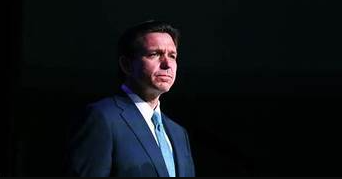It was embarrassing for the Florida governor and Elon Musk. It could be a tragedy for American democracy.
Ron DeSantis’s campaign launch on Twitter Spaces was anything but smooth. When the Florida governor took to the platform on 24 May, it was clear that his highly anticipated presidential announcement was unraveling before it even began. By the time DeSantis was audible, the technical glitches had already overshadowed the event, much like the malfunctioning of Elon Musk’s servers. The hashtag #DeSaster began trending, cementing the event’s disastrous reputation. Nicknames like Tiny D, Meatball Ron, and Ron DeSanctus quickly gained traction, further tarnishing his image.
The event, meant to signal DeSantis’s entry into the race, instead turned into a spectacle of failure. Musk, known for his high-tech ventures, seemed ill-prepared for the responsibility of hosting a political announcement. His platform, designed for quick interactions and not for dignified moments, struggled to accommodate the gravity of such an announcement. Despite boasts from DeSantis’s campaign sidekick, David Sacks, about “breaking the internet,” the numbers—600,000 listeners rapidly diminishing—only highlighted the collapse.
What was intended to be a savvy, modern campaign launch on a tech-driven platform instead showcased the pitfalls of relying on social media to make serious political statements. Instead of presenting DeSantis as a formidable contender, it left him looking like a candidate out of touch with the fundamentals of American politics.
The failure was not just a minor embarrassment; it had deeper implications. If DeSantis cannot even manage a simple launch event without technical difficulties, how can voters trust him to lead the country? The spectacle reinforced a troubling trend in political campaigns: the focus on image and optics, often at the expense of substance. It raised important questions about the role of technology in modern political discourse and whether it is actually serving democracy or undermining it.
For DeSantis, this embarrassing misstep could be just the beginning of a challenging road ahead. If he cannot recover from this launch disaster, it may signal deeper issues with his campaign’s organization and vision. But the consequences are not just personal for DeSantis. This failed campaign launch is a symptom of a larger problem in American politics: the increasing reliance on media spectacle and tech-driven stunts rather than a genuine focus on the issues that matter to voters.
Elon Musk’s involvement only added to the sense that the event was more about technological innovation than effective political discourse. Musk, a figure associated with technological disruption, is perhaps not the right person to be guiding a political campaign. DeSantis’s reliance on such figures could further alienate voters who are tired of the tech industry’s influence on politics.
Ultimately, the disaster of DeSantis’s campaign launch is a reminder that, in the end, political leadership requires more than just viral moments—it requires a deep understanding of the needs and concerns of the electorate. Without that, no amount of Twitter hype or flashy technology will be enough to carry a candidate to victory.

